When choosing an ISP subscription in the UK, it’s essential to focus on security features that safeguard your online activities and personal information. Look for advanced encryption protocols, malware protection, and secure DNS services to ensure a safer internet experience and protect against unauthorized access and data breaches.
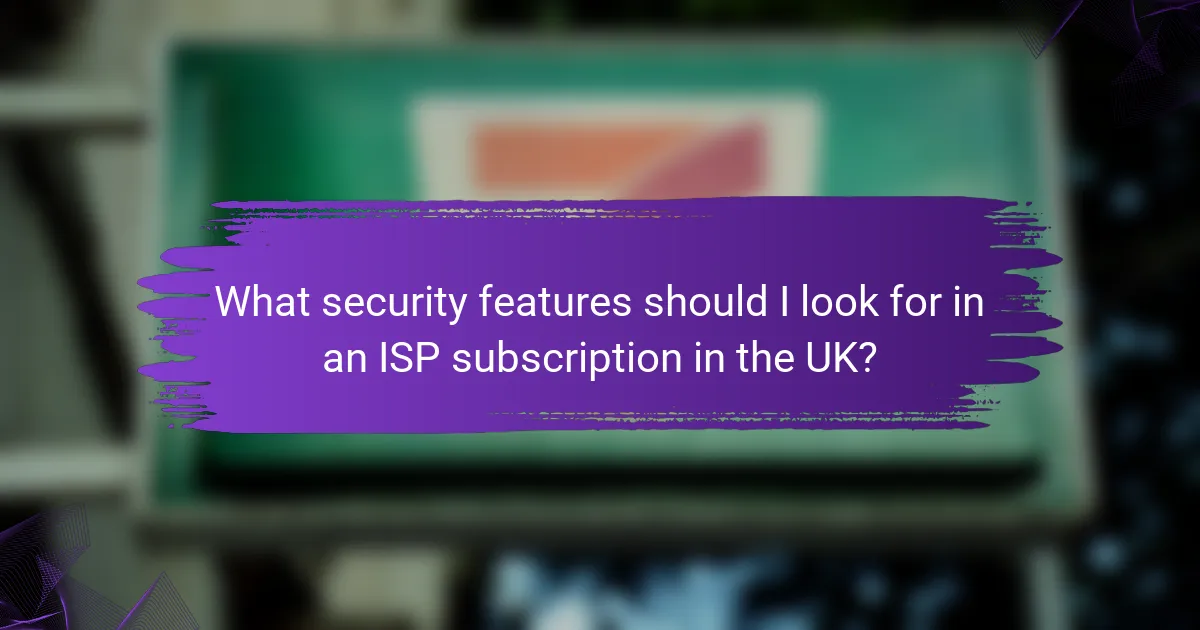
What security features should I look for in an ISP subscription in the UK?
When selecting an ISP subscription in the UK, prioritize security features that protect your online activities and personal information. Key aspects include advanced encryption protocols, malware protection, firewall integration, data privacy compliance, and secure DNS services.
Advanced encryption protocols
Advanced encryption protocols are essential for safeguarding your internet connection. Look for ISPs that offer at least AES-256 encryption, which is widely regarded as secure. This level of encryption helps protect your data from unauthorized access, especially when using public Wi-Fi networks.
Some ISPs may also provide VPN services that utilize these encryption protocols, adding an extra layer of security. Consider whether the ISP’s encryption methods comply with industry standards to ensure robust protection.
Malware protection services
Malware protection services help detect and block malicious software that can compromise your devices. Many ISPs offer built-in malware protection as part of their subscription, which can scan for threats in real-time and prevent downloads of harmful content.
When evaluating ISPs, check if their malware protection includes regular updates and a comprehensive database of known threats. This feature can significantly reduce the risk of infection and enhance your overall online safety.
Firewall integration
Firewall integration is crucial for monitoring and controlling incoming and outgoing network traffic. A good ISP should offer a firewall that can be easily configured to suit your needs, providing an essential barrier against unauthorized access.
Some ISPs provide hardware firewalls, while others may offer software solutions. Ensure that the firewall is regularly updated to protect against new vulnerabilities and that it allows you to customize settings for optimal security.
Data privacy compliance
Data privacy compliance is vital for ensuring that your personal information is handled responsibly. In the UK, ISPs must adhere to the General Data Protection Regulation (GDPR), which mandates strict guidelines on data collection and usage.
When choosing an ISP, review their privacy policy to understand how they manage your data. Look for transparency regarding data retention periods and whether they share information with third parties.
Secure DNS services
Secure DNS services enhance your browsing security by preventing access to malicious websites. An ISP that offers secure DNS can help block phishing attempts and other online threats before they reach your device.
Consider ISPs that provide DNS filtering options, allowing you to customize your protection level. This feature can be particularly useful for families or businesses looking to restrict access to harmful content.
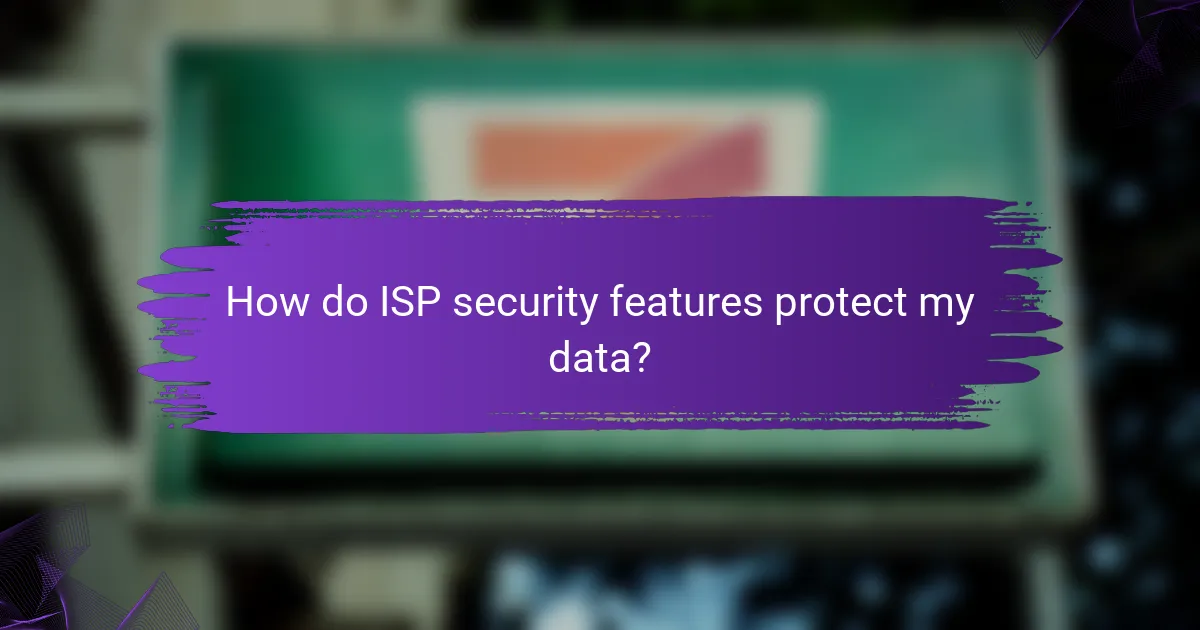
How do ISP security features protect my data?
ISP security features protect your data by implementing various technologies and protocols that safeguard your online activities. These measures help prevent unauthorized access, data breaches, and malicious attacks, ensuring a safer internet experience.
Prevention of data breaches
ISPs employ encryption protocols and secure data transmission methods to prevent data breaches. This means that your personal information, such as login credentials and financial details, is scrambled during transmission, making it difficult for hackers to intercept.
Additionally, many ISPs offer tools like firewalls and intrusion detection systems that monitor for suspicious activity. Regular updates and security patches are also crucial in maintaining a robust defense against potential vulnerabilities.
Protection against phishing attacks
ISPs can help protect users from phishing attacks by providing email filtering and detection services. These services identify and block suspicious emails that may attempt to steal personal information through deceptive links or attachments.
Furthermore, some ISPs offer security awareness training for their customers, teaching them how to recognize phishing attempts. This proactive approach empowers users to make informed decisions and avoid falling victim to scams.
Safe browsing experience
ISPs enhance safe browsing by offering DNS filtering services that block access to known malicious websites. This prevents users from inadvertently visiting sites that could compromise their data or install harmful software.
Moreover, many ISPs provide VPN services that encrypt your internet connection, adding an extra layer of security while browsing. This is particularly useful when using public Wi-Fi networks, which are often less secure and more susceptible to attacks.
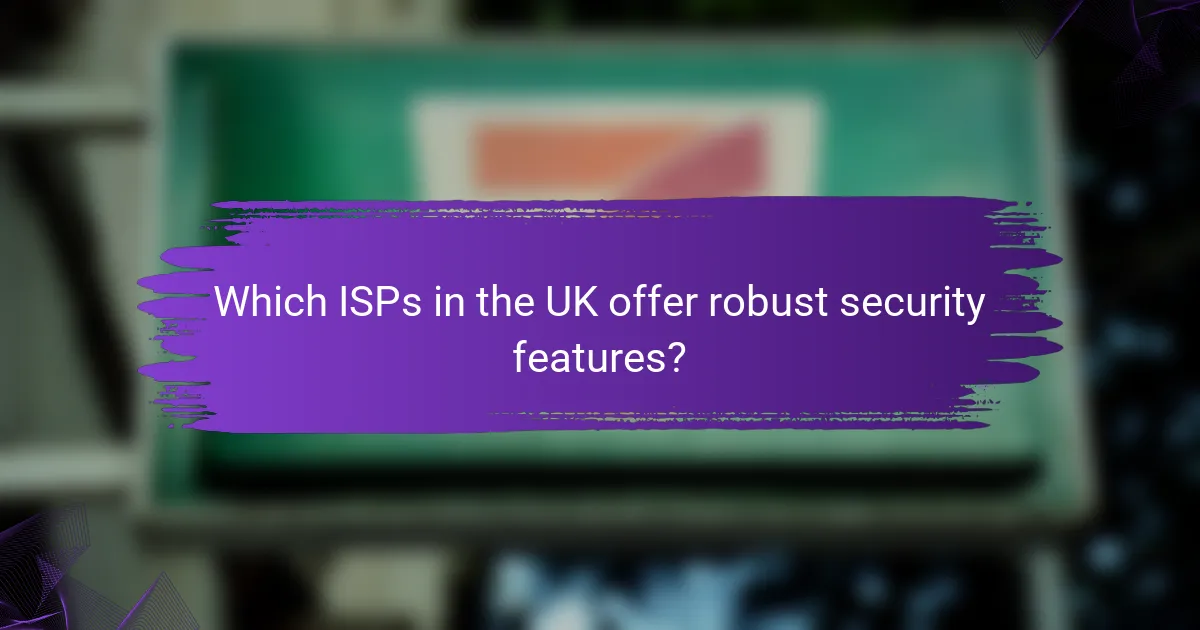
Which ISPs in the UK offer robust security features?
Several ISPs in the UK provide strong security features to protect users from online threats. Key players like BT, Virgin Media, and Sky offer various tools and services designed to enhance internet safety and privacy.
BT Broadband security options
BT Broadband offers a range of security features, including BT Virus Protect, which provides antivirus protection for devices connected to the network. This service helps to block malware and phishing attempts, ensuring safer browsing experiences.
Additionally, BT includes a Smart Home Protect feature, which monitors connected devices for vulnerabilities. Users can benefit from parental controls that allow them to restrict access to inappropriate content, making it a solid choice for families.
Virgin Media security services
Virgin Media provides comprehensive security services, including a free antivirus solution and a web safe feature that blocks harmful websites. Their security package is designed to protect users from common online threats, enhancing overall internet safety.
Furthermore, Virgin Media offers a parental control option that allows parents to manage their children’s online activities effectively. This feature can be customized to suit different age groups, providing peace of mind for families.
Sky Internet security features
Sky Internet includes a range of security features, such as Sky Broadband Shield, which filters out harmful content and provides customizable parental controls. This tool helps users manage what can be accessed on their network, catering to various family needs.
Sky also offers a free antivirus solution for devices connected to their network, ensuring that users are protected from malware and other online threats. Regular updates to their security systems help maintain a robust defense against emerging risks.
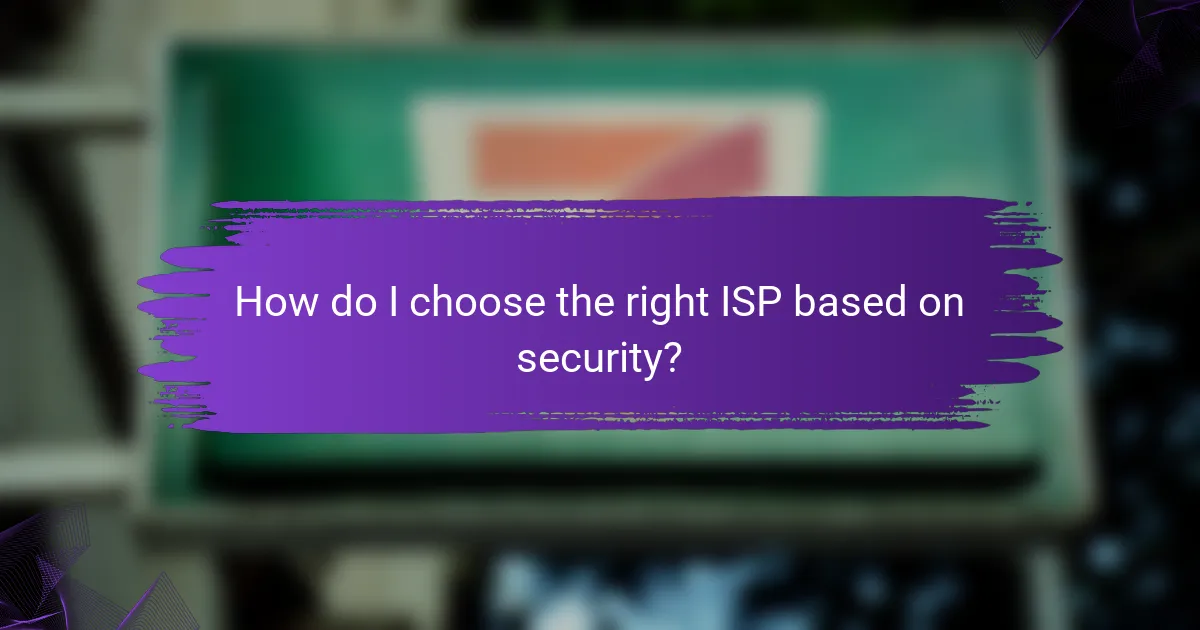
How do I choose the right ISP based on security?
Choosing the right Internet Service Provider (ISP) based on security involves assessing the security features they offer, such as encryption, firewalls, and malware protection. Prioritize ISPs that provide robust security measures to safeguard your data and online activities.
Evaluate security feature comparisons
When evaluating ISPs, compare their security features side by side. Look for offerings like end-to-end encryption, intrusion detection systems, and secure DNS services. Some ISPs may also provide additional tools like VPNs or parental controls, which can enhance your online safety.
Consider creating a checklist of essential security features and rating each ISP based on their offerings. For example, an ISP that includes a built-in firewall and regular security updates may be more favorable than one that lacks these protections.
Consider customer reviews on security
Customer reviews can provide valuable insights into an ISP’s security performance. Look for feedback specifically related to security incidents, response times, and overall satisfaction with security features. High ratings in these areas can indicate a reliable provider.
Be cautious of ISPs with numerous complaints about security breaches or inadequate customer support. A pattern of negative reviews may signal potential risks to your data security, making it essential to choose an ISP with a strong reputation for protecting its customers.
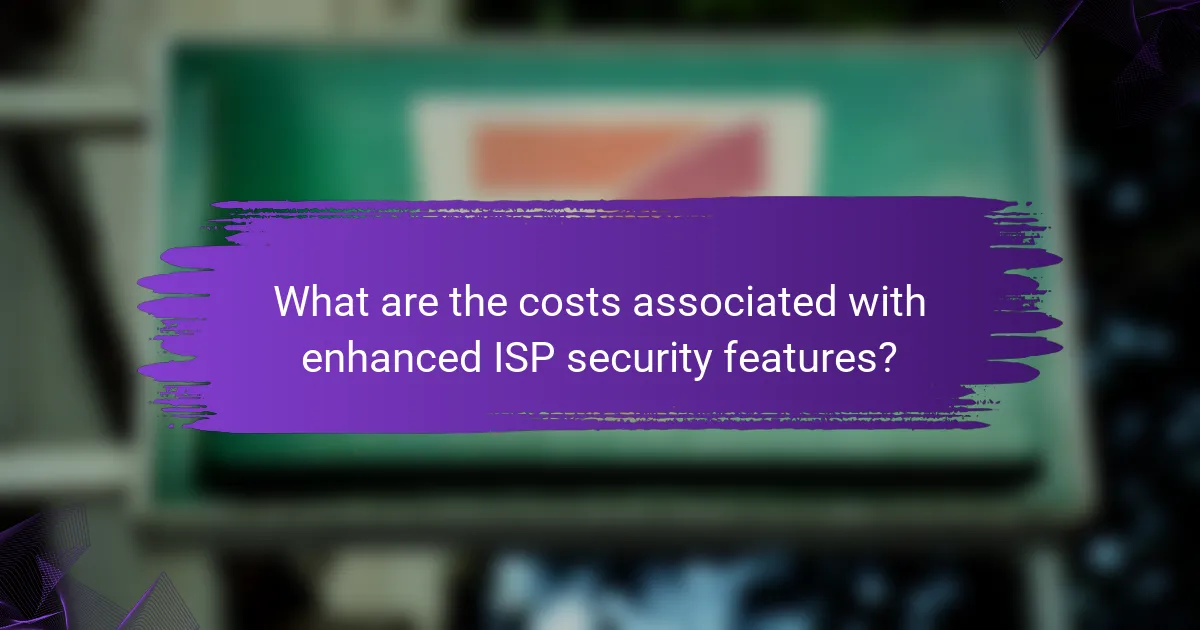
What are the costs associated with enhanced ISP security features?
The costs associated with enhanced ISP security features can vary widely based on the provider and the specific services offered. Generally, these costs include monthly subscription fees, one-time setup costs, and additional charges for premium features.
Monthly subscription fees
Monthly subscription fees for enhanced ISP security features typically range from around $5 to $20, depending on the level of protection and the provider. Basic packages may include firewall protection and malware detection, while higher-tier plans often offer more comprehensive security measures.
When selecting a plan, consider the specific features included and how they align with your security needs. Some ISPs may offer discounts for annual subscriptions, which can reduce the overall cost.
One-time setup costs
One-time setup costs can vary significantly, often falling between $50 and $200. These fees may cover the installation of necessary hardware or software, as well as initial configuration services provided by the ISP.
It’s important to inquire about these costs upfront, as some ISPs may waive setup fees for new customers or during promotional periods. Always clarify what services are included in the setup fee to avoid unexpected charges.
Additional charges for premium features
Additional charges for premium features can add to your overall costs, typically ranging from $10 to $50 per month. These features might include advanced threat detection, VPN services, or identity theft protection.
Before committing to premium features, assess whether they provide sufficient value for your specific security requirements. Some ISPs may bundle premium features into higher-tier plans, so compare options to find the best fit for your budget and needs.
